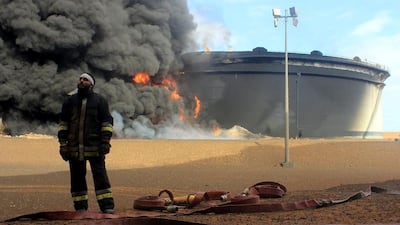As ISIL tightens its grip on the Libyan costal city of Sirte, there are suggestions that it will become the target of US air raids. The Americans have already conducted raids on what was said to be an ISIL training camp foothold in Sabratha, close to the Tunisian border, and observers say it is only a matter of time before their attention turns to Sirte. The city was the last stronghold of the former Muammar Qaddafi regime until October 2011, when he was killed.
The majority of Sirte residents were, and still are, supporters of the old regime, as are several other Libyan tribes and communities, although they do so in silence.
Furthermore, many people in Sirte today prefer being ruled by ISIL rather than the Misratan militias who dominated the city right after it was subdued in 2011. If you ask them why, the answer is simple: Misratan militias destroyed the city, looted properties, killed innocent people, jailed hundreds of people without trial and discriminated against those they were supposed to liberate and protect simply because they were pro-Qaddafi.
A common comment on social media sites attributed to Sirte residents is: “ISIL’s hell is better than Misrata’s paradise.” This should be seen as a statement of dismay and anger towards the latter, not as an open-arms welcome to ISIL.
Residents will tell you today that their city is safer under ISIL and that people are left alone as long as they keep to themselves and do not interfere with the extremists’ activities.
We should remember that Sirte’s mixed population is divided along tribal lines, like many other cities in Libya, and that most of those tribes detest ISIL and stand ready to play their part in getting rid of it. In fact, they attempted to do so last summer with terrible consequences, since they did not get any support or backup from the self-professed government in Tripoli. As recent as a week ago Khaled Alwerfally, locally known in Sirte as a sniper, was killed along with members of his family when ISIL stormed his home.
We also have to bear in mind that most Sirte residents point to this incident as proof that the Tripoli government and Misratan militias had literally handed over Sirte to ISIL without a fight.
While western powers now appear ready to intervene in Sirte, they should keep in mind that linking ISIL to former regime supporters is misleading, and it will only lead to further alienation of the very people who will be able to confront and defeat ISIL on the ground once they have the support they need.
Many analysts seeking to make a connection between ISIL and former regime supporters will refer to a recent interview by Ahmed Gaddaf Al Dam, a relative and one-time close aide of the late Qaddafi, in which he appeared to talk positively about ISIL. However, these analysts forget to mention that this man was among the earlier deserters from the regime in February 2011. Among other former regime supporters he is referred to as a traitor who deserves no respect at all.
ISIL could not exist without some kind of social incubators. Its biggest enemy is tribally based society in which tribes have dominant moral power and collective leadership.
Unfortunately, in the case of Sirte, the tribal cohesion of residents has broken down because of the thousands of people who were forced to flee between 2011 and 2013. Hundreds of others are still being kept in jail without trial.
As we have seen in Syria and Iraq, bombing ISIL in Sirte will not solve the problem. It will probably result in a great number of civilian deaths, driving more potential recruits into ISIL’s arms. It will also potentially deprive the would-be liberators of the cooperation of people who know the area well and are familiar with ISIL’s tactics inside the city.
Five years after the Qaddafi regime was destroyed by Nato, many Libyans have been reconsidering their earlier euphoric support for the revolution by comparing their lives under Qaddafi and today.
The country is lacking in security, order and peace, and it is riddled with armed militias of all sorts.
Any military plans against ISIL in Libya should not incorporate the political view of linking that organisation to supporters of the former regime, otherwise it will be doomed as soon as it’s hatched.
Mustafa Fetouri is an independent Libyan academic and an award-winning journalist

